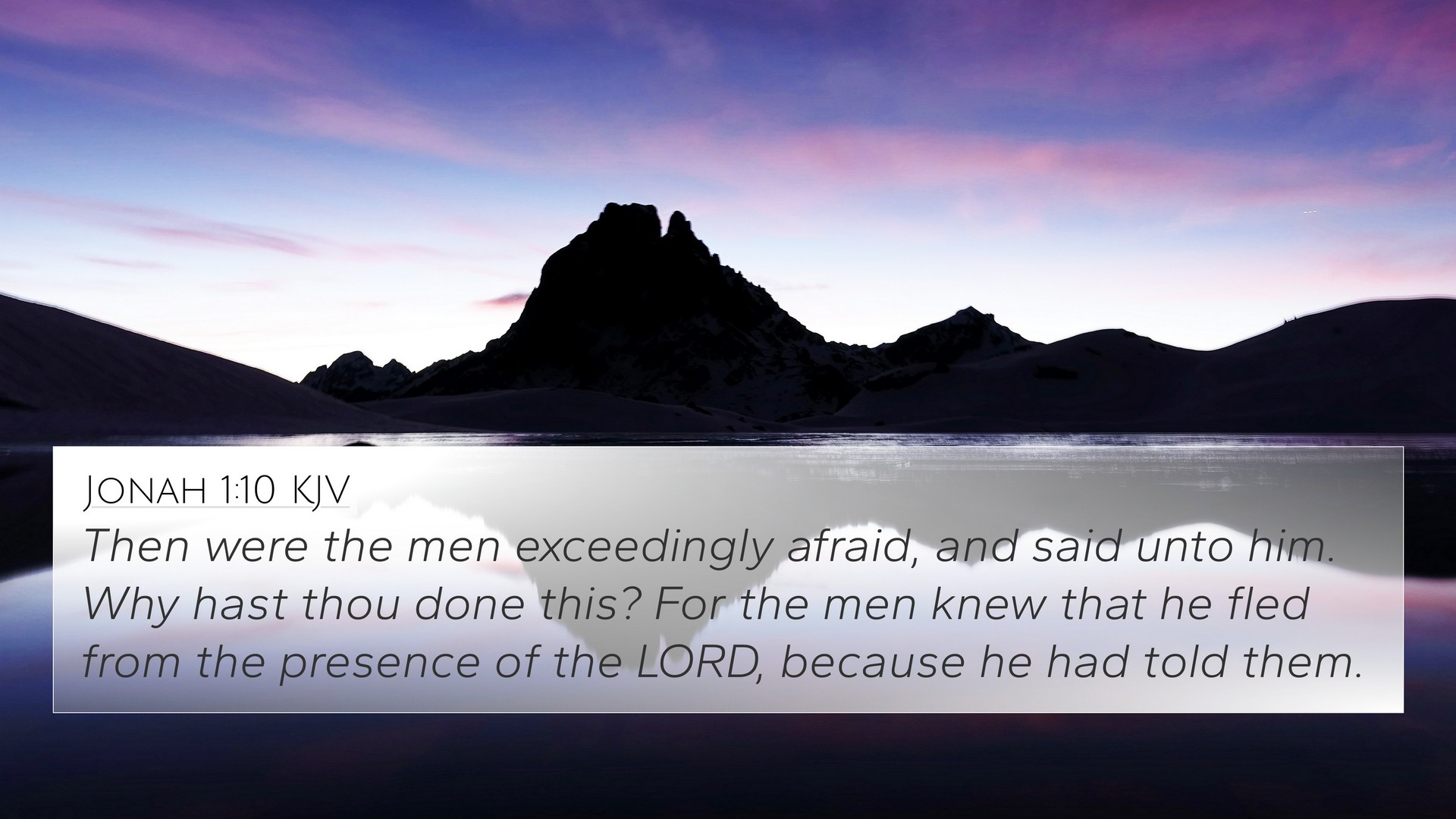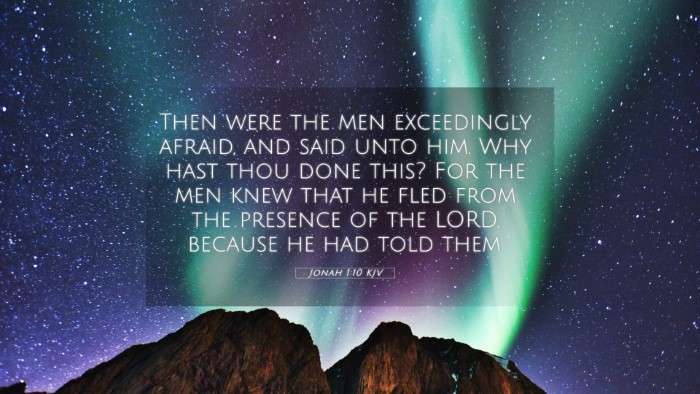Old Testament
Genesis Exodus Leviticus Numbers Deuteronomy Joshua Judges Ruth 1 Samuel 2 Samuel 1 Kings 2 Kings 1 Chronicles 2 Chronicles Ezra Nehemiah Esther Job Psalms Proverbs Ecclesiastes Song of Solomon Isaiah Jeremiah Lamentations Ezekiel Daniel Hosea Joel Amos Obadiah Jonah Micah Nahum Habakkuk Zephaniah Haggai Zechariah MalachiJonah 1:10 Similar Verses
Jonah 1:10 Cross References
Then were the men exceedingly afraid, and said unto him. Why hast thou done this? For the men knew that he fled from the presence of the LORD, because he had told them.
Uncover the Rich Themes and Topics of This Bible Verse
Listed below are the Bible themes associated with Jonah 1:10. We invite you to explore each theme to gain deeper insights into the Scriptures.
Jonah 1:10 Cross Reference Verses
This section features a detailed cross-reference designed to enrich your understanding of the Scriptures. Below, you will find carefully selected verses that echo the themes and teachings related to Jonah 1:10 KJV. Click on any image to explore detailed analyses of related Bible verses and uncover deeper theological insights.
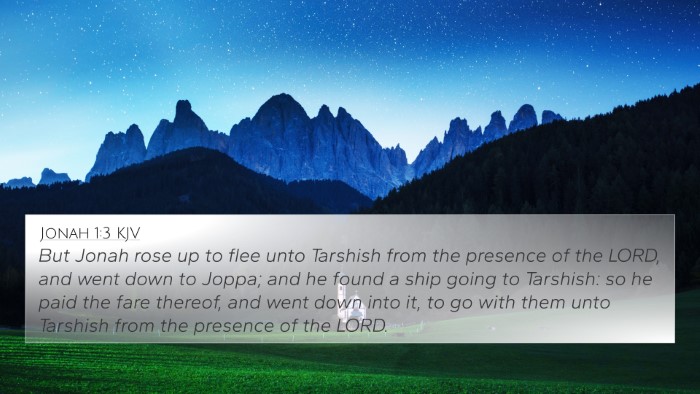
Jonah 1:3 (KJV) »
But Jonah rose up to flee unto Tarshish from the presence of the LORD, and went down to Joppa; and he found a ship going to Tarshish: so he paid the fare thereof, and went down into it, to go with them unto Tarshish from the presence of the LORD.
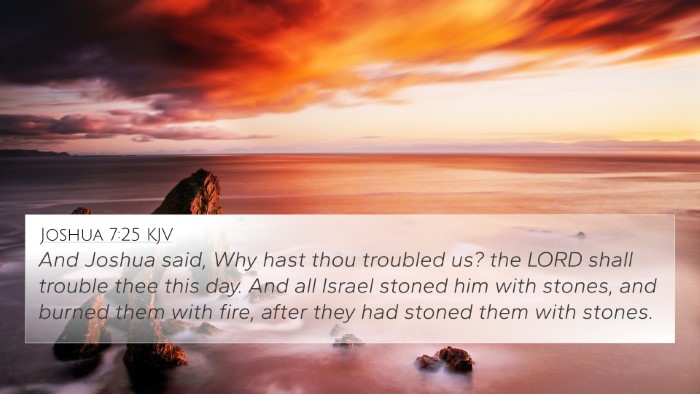
Joshua 7:25 (KJV) »
And Joshua said, Why hast thou troubled us? the LORD shall trouble thee this day. And all Israel stoned him with stones, and burned them with fire, after they had stoned them with stones.

2 Samuel 24:3 (KJV) »
And Joab said unto the king, Now the LORD thy God add unto the people, how many soever they be, an hundredfold, and that the eyes of my lord the king may see it: but why doth my lord the king delight in this thing?
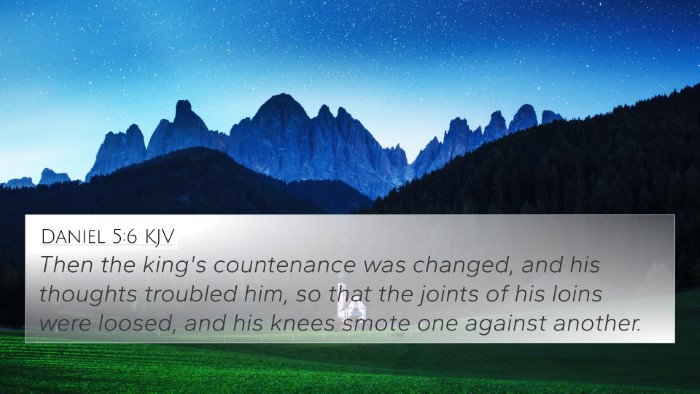
Daniel 5:6 (KJV) »
Then the king's countenance was changed, and his thoughts troubled him, so that the joints of his loins were loosed, and his knees smote one against another.
Jonah 1:10 Verse Analysis and Similar Verses
Bible Verse Meaning: Jonah 1:10
Jonah 1:10 states, "Then were the men exceedingly afraid, and said unto him, Why hast thou done this? For the men knew that he fled from the presence of the LORD, because he had told them." This verse captures a pivotal moment in the narrative of Jonah, highlighting the deep fear and concern of the sailors upon discovering Jonah's actions.
Summary of Insights
The verse reveals crucial aspects of Jonah's character and the reactions of the sailors. It demonstrates Jonah's folly in attempting to flee from God and showcases the sailors' spiritual awareness despite their initial ignorance. Their fear is not merely of the storm, but of the implications of Jonah's disobedience to God.
Commentary Insights
- Matthew Henry:
Henry emphasizes the sailors' realization that Jonah's rebellion against God was the cause of the storm. Their fear escalates as they understand the divine judgment invoked by Jonah's actions. This moment illustrates the seriousness of turning away from God and the universal acknowledgment of His sovereignty.
- Albert Barnes:
Barnes points out that the sailors' questioning of Jonah signifies their astonishment at his actions compared to their own responses. They were driven to desperation by the storm, while Jonah chose to hide from his responsibilities. This juxtaposition invites readers to reflect on personal accountability and the consequences of evading God's call.
- Adam Clarke:
Clarke notes that the sailors, though pagans, exhibited greater fear of divine retribution than Jonah, a prophet. This highlights the theme of God’s reach beyond Israel, showcasing how God’s design often transcends traditional boundaries and reaches the hearts of diverse individuals.
Bible Verse Cross-References
To enhance understanding, here are several cross-references that relate to Jonah 1:10:
- Psalm 139:7-10: Reflects on the omnipresence of God, affirming that escaping His presence is impossible.
- Proverbs 15:3: Illustrates that the eyes of the Lord are everywhere, watching the good and the evil, resonating with Jonah’s attempt to escape God's watchful eye.
- Isaiah 43:2: Ties into the theme of God’s protection and presence through trials, contrasting with Jonah’s flight.
- Matthew 12:39-41: Where Jesus refers to Jonah, drawing parallels between his experience and His resurrection to call attention to Jonah's prophetic significance.
- Romans 1:20: Speaks to the universality of God's revelation in creation, similar to the sailors' intuition regarding Jonah's disobedience.
- Hebrews 4:13: Emphasizes that nothing is hidden from God’s sight, reinforcing the futility of Jonah’s attempt to flee.
- Acts 16:27-30: Displays a parallel of fear and realization in the context of divine intervention, similar to the sailors’ fear when confronted with Jonah’s God.
- 1 Samuel 15:22-23: Highlights the importance of obedience to God, akin to Jonah’s failure to heed God's command.
- Jeremiah 23:24: Abundant themes of God’s omnipresence and the futility of hiding from the Almighty are echoed here.
- Luke 8:25: Captures the concept of fear in the face of nature’s fury, akin to the sailors’ response to the storm created by Jonah’s actions.
Thematic Connections within the Bible
Jonah 1:10 is not only central to the narrative of Jonah but also connects with broader themes throughout the scriptures. Below are key themes and their connections:
- Disobedience to God: This theme resonates throughout the Bible, including stories of Adam and Eve (Genesis 3:1-6) and Saul (1 Samuel 15).
- The Sovereignty of God: Present in the narrative of Job and the teachings in Psalms regarding God's control over nature.
- Fear of the Lord: found in Proverbs and echoed in the experiences of the early disciples in the New Testament.
- Salvation and Repentance: The arc of Jonah's story connects with broader biblical motifs of repentance and God’s mercy, which can be seen in Luke 15 (the Parable of the Prodigal Son).
Using Bible Cross-References Effectively
Utilizing Bible cross-references can enhance one's understanding of themes, characters, and divine principles throughout both the Old and New Testaments. Here are some effective methods for cross-referencing Biblical texts:
-
Identify Key Terms:
Look for specific words or themes in a selected verse and explore their occurrences in different contexts across the Bible.
-
Utilize Bible Concordances:
These reference tools can help you find related scriptures and studies based on key terms or passages.
-
Contextual Study:
Understanding the narrative context of related verses can deepen comprehension of their meanings.
-
Thematic Analysis:
Explore how a specific theme is developed across various books of the Bible by identifying connections to a broader narrative.
